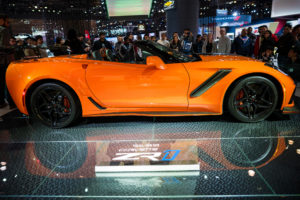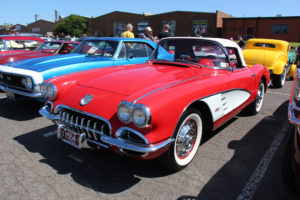I am a car lover through and through. The engineering, the design, the speed. All of it. However, I don’t own a sports car, and “fast” would not be how I describe my trips around town.
Why? Because I have a true disdain for depreciating assets. I can’t stand knowing that something I own loses value every second. Especially something that has very little use.
It is common to hate on owning new cars, especially impractical ones, in the personal finance world. Diehards are driving old Camry’s and Civic’s, and I get it. Why buy a Corvette as a daily driver when an Accord can get you to the same place more comfortably and probably more reliably.
But what is a car lover to do?
The Inefficiencies of a Weekend Car
If I were to purchase a “weekend car,” it would hurt even worse than daily driving a sports car as a daily driver. 5/7 days a week, it depreciates, and I don’t get to drive it.
Why? Because the gas mileage sucks and I need to limit the miles on the car, so it doesn’t depreciate any faster.
It is a horrible situation and one that I think about fairly often especially in the summertime when cars are starting to emerge from their winter garaging (read: 6 months of depreciation, but no use).
My wife and I love going to car shows. Just like attending any enthusiast event, it’s incredible to see so many people together with love for a single hobby, regardless of whether I agree with the monetary choices.
There are two types of people and cars at car shows. Those with well maintained, fast, depreciating new cars and those with well maintained, fast, appreciating old cars.
Both cars are nice to look at, both have literal curb appeal, and both groups are fast, but the financials are vastly different.

The Cost of Depreciation on a Corvette
Since we are talking about a “fun” car, the depreciation curve is steep. Sports cars aren’t known for retaining value (in the short run). Take a Corvette. It has been a historically perfect example of a sports car. Fast, sleek, powerful. The 2018 Z06 boasts 650 hp.
Even I’m not sure why you need that much power, but then again, this conversation is not for someone who doesn’t want a sports car and is fine with their daily driver. For them, this post becomes useless information.
The 2018 Corvette Z06 comes with a price tag of roughly $80,000, not including taxes, tag, title, and other fees. But for the Corvette’s sake, we will stick with $80,000. Taking a look at the depreciation curve of this car, I present to you the current price of a 10-year-old 2008 Z06…
$40,000
That’s right, 50% of value vanished*. Poof.
The Corvette fanatics will quickly point out that this is a loss of $40,000 over ten years, so only $4,000 per year to drive a Corvette. Sure. But I would much rather drive a Corvette for ten years and pay $0 for the pleasure.
Going back in time
Now let’s jump back 50 years to 1968 and compare the depreciation curve from the ten years of 1968 to 1958 of the Corvette.
Looking back on these cars, the variation in used pricing is not as tight as the 2008 used market. Some cars have been restored, others that haven’t, some that are show quality, etc. But the median price of a 1968 Corvette is about $40,000*.
Side Note: These numbers are starting to seem made up since the price of a 1968 Corvette is the same as a 2008 Corvette, but it is true and just so happens to work perfectly for this non-scientific analysis.
The prices of a 1958 Corvette vary even more than the ’68. The median price is in the high $60,000’s with a jump to a group in the $90,000’s and another jump over $100,000 (award-winning, show quality cars). The lowest price listed, by $20,000, was an older restoration for $48,000*.
For this end of the depreciation appreciation curve, the value of a 1968 Corvette should gain 50% in value over the same ten years that a 2008 Corvette loses 50% in value (again, I swear I’m not making these numbers up).

Decision is in
For the numbers crunchers, this should be the end of the discussion. If you are looking for a sports car and want to feel the hundreds of horsepower under the hood, and your budget allows, then go for it, but pick the right year.
Don’t jump into the car that is going to lose you money, jump into the car that will maintain its value and even have the potential for appreciation.
Purchasing at the bottom of a depreciation curve means that selling the car in the future will likely end in little if any loss in value. However, if the car is of collector caliber (usually the sports cars), you could potentially see an increase in value. This makes cars a unique asset. The downside risk is limited, but there is still upside potential.
Other Considerations
Maintenance
Running costs for the older weekend cars are on average much lower. The internal mechanics are simpler allowing almost any mechanic to work under the hood which means the owners have negotiation room.
The parts for the older cars, especially American muscle, are widely available and inexpensive. However, the newer cars have both expensive parts and expensive labor. Most have to be serviced by the dealer, and an oil change is $100 (maybe) compared to the oil change on a ’69 Camaro that can be done at home or a local tire and lube.
Insurance
Insurance is also a big differentiator. Buy a car that’s 25 years or older, and you can get antique car insurance that costs a few hundred per year due to the low mileage of the weekend warrior. Compared to a new sports car’s insurance and there is a material difference, regardless of whether the car is a daily driver.
The Money Pit
There is a valid argument that these classic cars can be money pits. I am not arguing for buying a rusty Chevy Nova for $5,000 and spending $100,000 in restoration costs so that you can have a $30,000 Nova.
I am, however, all for buying this person’s $30,000 Nova that has had $100,000 done in restoration and will likely still be worth around $30,000 in 10 years. These deals are not difficult to find. Even an older restoration of 5-10 years is an excellent option for someone looking for a fun car that has been babied, but may not be a car show winner.
I would much rather take this scenario than buy a new $80,000 Corvette that will be worth $40,000 in ten years.
Sexy Car: Check
My goal is not to sway anyone one way or another. There are people who like cars and those that do not.
For those who don’t care what car gets them around, then this article is not for you. This post is for those, like me, who enjoy cars and love to drive, but don’t want to be royally screwed by depreciation.
For this group, make the decision wisely. If you have saved up and budgeted for a sports car, why have the money wasted on depreciation? Consider purchasing a classic where the pricing curve is in your favor, and you minimize the probability of losing any value if you ever wanted to sell.
*For the used Corvette price, I did a nationwide search on Autotrader.com of 2008 Z06 Corvettes and averaged the top 10 non-sponsored results. These are sorted by price, so this is the best case used scenario. For the 58/68 Corvettes, I searched on Autotrader classics. Not as many options, but this made the analysis easier.
photo credit: Corvette ZR1, license; 1960 Chevrolet C1 Corvette, license
Great article. I generally agree with you. A good classic car can be great for a car enthusiast.
I had a classic myself that I bought for $8k and drove a few years and then sold for $8k. (could have gotten more but it was a family to family sale) It was fun to own and drive and I broke even.
There are a few caveats:
1. Classic cars can be undependable by modern standards (not a big problem or surprise for car buffs)
2. Parts aren’t *always* cheap or available. This is more an issue if the car is more obscure.
3. Appreciation has been tepid in the past decade and is unlikely to impress long term. I personally predict there will be declines longer term as boomers age and 50-70’s era cars lose market demand.
4. Don’t expect to impress on the race track. That rumbling 400 hp V8 engine in my previous classic car could be beat 0 to 60 by a modern run of the mill Toyota Camry.
I would not treat a classic car as an investment. The Haggerty index is up ~2% annually for the past decade while stocks are up ~9%. But they do retain value at least and you can drive them. 🙂
Thanks for the comment, Jim. So many great points. There are downsides and I wouldn’t recommend replacing a daily driver for a classic, but if someone is looking for a weekend car then the classic has some major advantages compared to a modern sports car.
Great post, it’s astonishing to see how much is wasted on cars and yet, people keep buying them.
As a former classic car owner and one that aspires to get another one someday I really enjoyed this post. I love car shows as well. I love classic car drags. I love almost everything about them.
I think I’d like to get a 70s pickup that I can use to do my weekend warrioring. From a financial perspective I think the cost of ownership would be very low compared to a new F150 or RAM.
I’m glad you enjoyed the article, Ty! I’m with you on the 70s pickups (especially the fords). Simple, affordable and useful. Plus with the huge engine bay, maintenance is much easier.
I’ve always had a thing for cars from the 30s and 40s. It’s just something about the simplicity and the style. I don’t know if I’ll ever get one (or maybe I’ll end up with a 2030 or 2040 model year eventually!) because it is hard to justify the cost.
I’ve seen people advertise that they’ll chauffeur you around in their classic car, so that could be a way to pay for it and justify the cost.
Interesting idea. I know a classic car used as a “getaway” car opposed to a limo at weddings are not uncommon. Might be a cool niche.